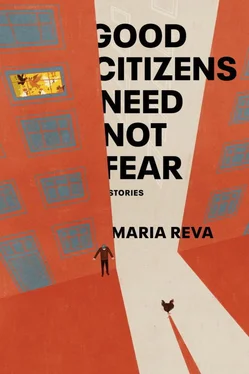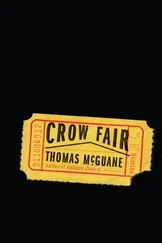“How am I supposed to know? No one’s ever asked for a Coltrane,” said Milena. She eyed the tray of buns poking over the top of the refrigerator, then glanced at Smena for permission. Smena nodded—she regretted not having offered them herself.
“You’re supposed to know what you’re selling,” said Larissa, hoarse voice rising. Smena shushed her. “How else do you test for fake clients, impostors?” Larissa whispered.
“Speaking of,” Milena said through a mouthful of bun.
Smena and Larissa turned to her.
“It’s probably nothing,” Milena tried.
“Tell us the nothing,” said Smena.
Milena scratched a spot of grime off the window with her fingernail. “I was at the park, my usual spot by the thousand-year oak, when a guy came up to me. Skinny, with a sad attempt at a mustache. Asked for a KISS. Like the group. The music group.”
“Very good,” said Larissa, rolling her eyes.
“I started to grill him,” Milena continued. “Year the band got together, band leader’s middle name, year of their breakout single, whichever useless facts Larissa shoves down my ear.” She winked at Larissa, who turned away in a huff. “The guy was doing well, seemed to know everything. Then he started grilling me . Asked why Ace Frehley added eyeliner to his iconic ‘Space Ace’ makeup design. What was I supposed to do, look stupid? I played along, answered best I could, but when I asked, ‘So are you buying the album or not?’ he only said, ‘Nah, I got what I came for.’ ”
“And then?” asked Smena.
“He just walked off.”
Milena helped herself to another bun. She mashed the entire thing into her mouth, and Smena watched her masticate it without any apparent enjoyment. There were only four buns left, and she imagined what would happen once they were all gone, how she’d gnaw on laurel leaves, suck peppercorns for taste.
After a while Milena said in a low voice, “It’s what they do. Play with you first, see you flail, knowing you have nowhere to go.”
“Play is all it is,” countered Larissa. “No one gets sent to the camps anymore. Human rights,” she proclaimed, chin tilted up, “are in vogue.”
“My sweet thing,” cried Milena. She sank down to the stool beside Larissa, grasped the young woman’s hand. At first Smena took Milena’s outburst for sarcasm, but Milena seemed genuinely shocked by Larissa’s innocence, as if she’d discovered a kitten playing in a dumpster. Larissa blushed, but did not retract her hand before Milena let go.
When Smena had starting making bone records, in the fifties, the risks were clear, the boundaries stable. Now an invisible hand was loosening the screws, but it was impossible to tell which screws, and for how long the loosening would last. Although no one got sent to the camps (for now), every citizen was able to imagine more clearly than ever before what might await them in those very camps; the newspapers had begun publishing prisoners’ accounts, down to the gauge of the torture instruments.
“Camps or no camps,” Milena said, “prison wouldn’t be fun either.” She turned to Smena. “So what do we do?”
“You didn’t show the man any of the albums?” Smena asked. “You kept them inside your coat the whole time?”
Milena nodded. “He saw nothing.”
While the possible punishment was unclear, something else was not: they all needed the money.
Larissa turned to Milena. “When the man asked why Ace started using eyeliner, what did you say?”
“To keep the silver face paint out of his eyes. He’s become allergic.”
Larissa smiled proudly.
—
Now Nika visited Smena every week. She would bring soup or cabbage pie, and the pair would sit down for a midday meal followed by tea. Each time Nika knocked, Smena vowed to confront her. If Nika really was looking to extort her, Smena was willing to preempt, negotiate, even give her a cut of the bone music profits. But confronting Nika would also mean admitting to the business, and what if the woman wasn’t willing to negotiate? And, a distant possibility: What if Nika wasn’t trying to extort her at all? More and more, Smena was willing to believe it.
In truth, she didn’t mind Nika’s visits. The woman’s chatter offered a lens into the outer world that the newspapers—which Smena had mostly stopped reading anyway—could not. From Nika, Smena learned that the irises were blooming, the flowers floppy as used handkerchiefs; that it was the time of year when woodpeckers drummed on utility poles down by the river, to woo their mates. Nika exclaimed, “Can you imagine the ruckus?” Yes, Smena could.
Week to week, Smena watched the change in Nika over the rim of her teacup. One visit, Nika’s slur was so pronounced Smena could barely understand her, and the pair sat in silence, pretending nothing was wrong. Another visit, Nika regaled Smena with jokes, but as she spoke her face lacked expression, as though she were posing for a government identification photo.
“You keep giving me a funny look,” Nika remarked on that occasion.
Smena tried to brush it off. “I’m impressed. You tell a joke but keep such a straight face.”
“I’m losing feeling in my face.”
“Oi.”
“My daughter-in-law says it’ll do wonders for the wrinkles.”
“The brat.”
“I’ll look all the better when they bury me.” A strand of hair fell over Nika’s eyes and her hand pecked at her forehead, trying and failing to find the strand.
“You should be in the hospital, Nika.”
The women locked eyes.
“So you’ve looked at the scans,” said Nika.
“I don’t know why you keep giving them to me.”
Nika shrugged. “They’re as useless to me as they are to the doctors who order them.”
“What do you mean?”
“The polyclinic has quotas for tests, so they do tests. Or they just make the numbers up to fill the quotas, so their money and supplies don’t get cut. The polyclinic’s filled with these ghost patients and can’t admit new ones.”
“You have a growth in your brain the size of a lemon and they can’t admit you?”
“They can’t admit me because of the lemon. I’m not a viable patient.”
“With your new face I can’t tell when you’re joking.”
“Really, Smena, when was the last time you went out into the world?” Nika sighed, as if she were about to explain basic arithmetic. “The polyclinic doesn’t want to exceed their death quota.”
“Which I’m sure they’ve made up.”
“Doesn’t matter. The nurse said if they exceed the quota, they get investigated, and if they get investigated, it’s worse for all of us.”
“How nice of her to give you an explanation.”
“It was,” she said softly. “I gave her chocolates.”
Smena looked at her neighbor. She was a shell of the woman who had first come to Smena’s door two months ago, determined to get her way.
“At least you can make something useful out of the scans,” said Nika. “Something beautiful.”
Smena heaved herself to her feet. A vertiginous feeling overwhelmed her. She saw herself on the edge of a precipice, its bottom beckoning. She feared heights, perhaps because she also loved them—she always wondered what would happen if she jumped.
Smena swung open the cabinet above the fridge. She retrieved the five albums she had made for Nika and spread them out on the table in chronological order. She pointed to the first, the Megadeth. “You won’t like this one at first but it’ll grow on you. Listen to it when you’re alone, and imagine the sounds pouring from your own mouth.” She pointed to the rest: “Pink Floyd, to relax to. Suzi Quatro and Julio Iglesias, to cheer up to.” Nika studied the scans on the table, the ripening shadow at the base of the cranium.
Читать дальше












